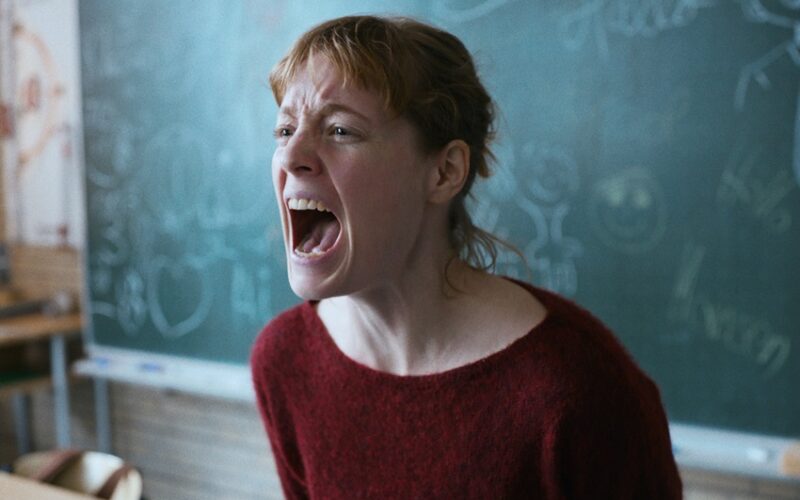The Teachers’ Lounge (Çatak, 2023)
The Teachers’ Lounge is a nasty little mousetrap of a movie. It is one of those films where circumstances spiral from bad to worse while basically well-intentioned people get more and more entangled in the slippery slope of unintended consequences to seemingly innocent decisions.
The two films it most reminds me of are Lars von Trier’s Dogville and Asghar Farhadi’s A Separation. One of those two, I loved. The other I hated. So, what’s the difference, and which one did The Teachers’ Lounge most resemble? All three films present nightmarish, at-times Kafkaesque, scenarios. The main difference, for me, is that Dogville always gives me the impression that it thinks it is being daring by speaking a horrible truth about the way the world really is, while A Separation leaves me believing that stupid systems have corrupted and broken ordinary people. In Farhardi’s movie, principled behavior, while perhaps circumstantially impossible, is something more than just an illusion. It might be a memory — a remnant of the collective unconscious insisting that there is another way to live besides that which the present moment affords. In Dogville, evil is the true nature of man, and lambs exist only to be slaughtered
The Teachers’ Lounge begins with teachers searching and interrogating students about a recent theft. Carla Nowak (Leonie Benesch) has some misgivings about about the way the system is handling a somewhat common problem, and she has just enough reflexive idealism to voice it. When she impulsively decides to use a hidden camera to see if she can get at the truth, she doesn’t stop to think about all the ways her decision could backfire or go sideways.
The screenplay certainly appears to have given a lot of thought about the ways it could go bad, though, because nearly all of the ones you immediately think of happen, and a few you probably didn’t think of happen as well. It is in the the perfect storm of bad luck, bad timing, and bad reactions that the film sometimes frustrates me. Bad things happen, but do they always happen? Does everything always unfold in the worst possible way?
History and literature are replete with stories of snowballing consequences culminating in colossally bad outcomes, but the best ones (in my experience) acknowledge that worst case scenarios are as rare as best case ones. That’s what differentiates films like Dogville from narratives like, say, Billy Budd. Sure, in the latter narrative everything has to happen in just the wrong way at just the wrong moment to result in tragedy, but part of the narrative’s meaning is derived from the characters being aware of that fact and pondering its significance given their experience that life isn’t always (or even usually) like this.
My reservation about films like The Teachers’ Lounge is not that events could never unfold this way but that film might be suggesting that they always do. That’s not realism; it’s surrealism. I’m down with surreal nightmares like Gett: The Trial of Viviane Ansalem or The Salesman or Brazil or The Death of Mister Lazarescu, that suggest authoritarian and/or bureaucratic systems tend to midwife surreal nightmares, But I’m not sure how I feel about films that suggest that liberalism run amok will do the same thing. Maybe there are places in the world where liberal authoritarianism isn’t some rhetorical whattaboutism used by conservatives to resolve cognitive dissonance, but even if the school in this movie were one of them, I am skeptical that the threads of policy could unravel so easily without a little more pulling.
That being said, I’m trying to think critical depictions of left-leaning societies that I do accept as realistic rather than caricature, and I cam up with….the Dardennes? The genius of a film like Two Day, One Night, though, is that it shows a range of responses to a system, all of which come across as credible given that different people are at different stages of their lives. The Unknown Girl shows a woman trying to work within a system and finding it hard to do what she thinks is right.
Ultimately what didn’t ring true to me about The Teachers’ Lounge probably wasn’t the idea that left-leaning structures and societies can warp and hinder well-intentioned individuals every bit as much as autocratic societies. Rather it was my hunch that they don’t (or wouldn’t) do so in exactly the same ways. Surrealism, for me, captures the emotional state of finding oneself in a nightmarish world, but the closer surrealism is to realism the harder it is not to question the implicit assumptions about how we arrived at or in the nightmare state. There were elements of the nightmare that was The Teachers’ Lounge that I recognized and related to, but I always knew I was dreaming.
And aren’t the scariest nightmares that ones you have when you’re awake?

